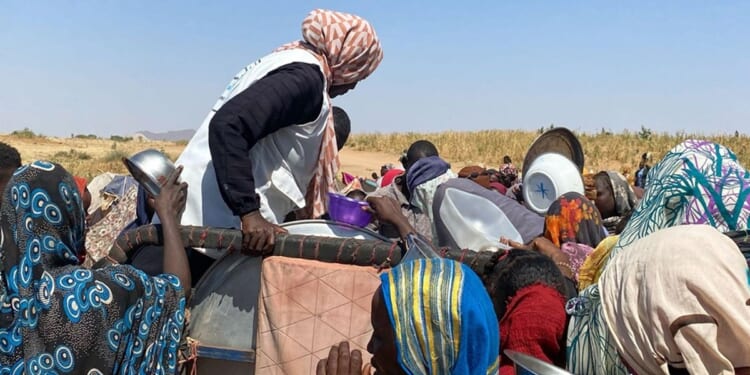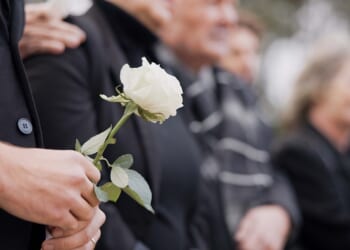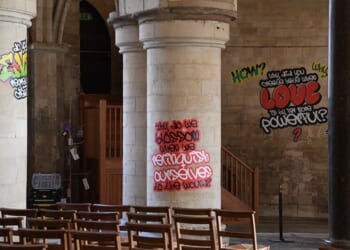IN THE wake of reports of summary executions, mass killings, rapes, and abductions in their country, the Bishops of the Episcopal Church of Sudan have issued a statement condemning the other countries “fuelling” the civil war.
The Bishops’ statement was published on 30 October. Four days previously, the city of El Fasher in north Darfur fell to the Rapid Support Forces (RSF) after a siege of more than 500 days. The RSF is a group rooted in the Janjaweed militias accused of atrocities in Darfur two decades ago.
Last Friday, a spokesman for the UN Human Rights Office said that it had received “horrendous accounts of summary executions, mass killings, rapes, attacks against humanitarian workers, looting, abductions and forced displacement”.
It has been alleged that at least 25 women were gang-raped when RSF forces entered a shelter for displaced people near El Fasher University.
The World Health Organization has estimated that 460 patients and companions were killed in a massacre in the Saudi Maternity Hospital.
“We call upon all parties to the conflict in Sudan to immediately cease hostilities, which have claimed countless lives and forced large numbers of Sudanese men, women, and children to flee their homes and seek refuge in various cities and countries,” the Bishops’ statement said.
”We condemn the countries that are fuelling the war in Sudan. As shepherds of God’s people, we express our deep grief and condemnation of the mass killing of civilians in all Sudan, including women and children, and all other atrocities committed by all sides across Sudan.” The Church would remain “an active partner in every sincere effort aimed at achieving comprehensive and sustainable peace in Sudan”.
On Sunday, Pope Leo condemned “indiscriminate violence against women and children, attacks on unarmed civilians, and serious obstacles to humanitarian action” which were “causing unacceptable suffering to a population already exhausted by long months of conflict”.
The UN reported on Monday that El Fasher remained “sealed off, with food, medicine and relief supplies blocked despite urgent appeals for access”. Almost 71,000 people have fled the city and surrounding areas since late October, the International Organization for Migration says. Many people have reported killings, abductions, and sexual violence.
Tom Fletcher, the head of the UN’s relief arm, said that El Fasher “recalls the horrors Darfur was subjected to twenty years ago”. He condemned a “crisis of apathy” in the international community. “Atrocities are committed with unashamed expectation of impunity . . . the world has failed an entire generation.”
In a statement calling for urgent international action in response to the reports from El Fasher, Christian Solidarity Worldwide drew attention to “credible reports” that the United Arab Emirates (UAE) had supported the RSF with arms, in facilitating the trading of gold and other natural resources from Darfur in international markets, and in recruiting mercenaries to train RSF fighters, including children, in combat.
Last week, Human Rights Watch (HRW) said that footage that it had analysed and verified showed RSF fighters “celebrating over large numbers of dead men and women, both in uniform and civilian clothes, executing apparent civilians, and taunting, abusing, and killing severely injured people”.
“The horrific images from El Fasher bear the hallmarks of the Rapid Support Forces’ record of mass atrocities,” HRW’s interim executive director, Federico Borello, said. “If the world doesn’t act urgently, civilians will bear the full brunt of more heinous crimes. The RSF’s backers, notably the United Arab Emirates, should press its leaders to rein in their forces, while global leaders should take robust measures against the RSF leadership.”
On Saturday, the Government announced £5 million of urgent funding for Sudan, in addition to the £120 million allocated to the country this year.
On Tuesday, the Liberal Democrat MP for Melksham and Devizes, Dr Brian Mathew, a former aid worker who has lived and worked in Sudan, told MPs that what had unfolded in El Fasher was “very much predicted, with warnings from numerous sources. Descriptions of El Fasher as another Srebrenica [the site of a massacre of an estimated 8000 men and boys during the Bosnian War] are not misplaced, although they are in many ways worse.” He called on the Government to “lead efforts to impose a binding, enforceable arms embargo across all of Sudan”.
The UN-backed IPC food security analysis has confirmed famine in both El Fasher and Kadugli in Darfur. It reports that more than 21 million people across Sudan are facing high levels of acute food insecurity. Around 375,000 people are on the brink of starvation. Sudan is now the world’s largest humanitarian and displacement crisis on record. About 14 million of a population of 51 million are displaced.
On 6 October, the International Criminal Court found Ali Muhammad Ali Abd-Al-Rahman (also known as Ali Kushayb), a leader of Sudan’s Janjaweed militia, guilty of war crimes and crimes against humanity which targeted members of non-Arab communities in Darfur between 2003 and 2004.
Responding, the Sudan specialist at Christian Solidarity Worldwide, Mohaned El Nour, said: “The same people, the RSF, who were the Janjaweed, and the Sudan Armed Forces are locked in a war against civilians. Coming in the midst of this, the court’s decision brings us a rare glimmer of hope that cycles of impunity can be broken and those responsible for crimes against the people of Sudan will one day be named in a court with their crimes listed in detail for the world to see.”

















